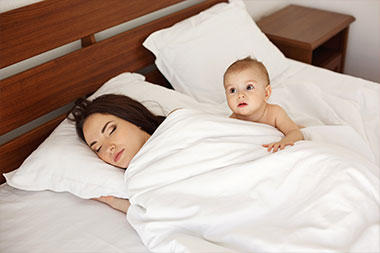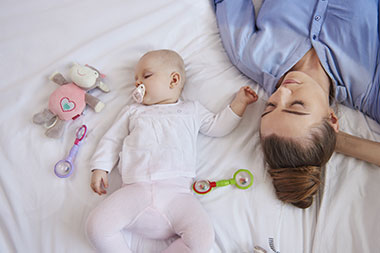What is Co Sleeping?
In simple words, it’s when the mother and baby sleep on the same surface together in close proximity.
Is it safe to co-sleep with your baby? and can it be done safely?
As a midwife, I always recommend babies to be put in their moses basket or cot to sleep, as Babies should have a clear sleep space, which is easy to create in a cot or Moses basket. I know however that families also wish to bed share, therefore we recommend making your bed a safer place for baby whether you doze off accidentally, or choose to bed share. Our advice on co-sleeping with your baby will tell you how. For safer co-sleeping:
- Keep pillows, sheets, blankets away from your baby or any other items that could obstruct your baby’s breathing or cause them to overheat. A high proportion of infants who die as a result of SIDS are found with their head covered by loose bedding.
- Follow all of our other safer sleep advice to reduce the risk of SIDS such as sleeping baby on their back
- Avoid letting pets or other children in the bed
- Make sure baby won’t fall out of bed or get trapped between the mattress and the wall
- Get the help of a newborn care nurse
As a midwife, we communicate clearly to our new mothers the dangers of co sleeping. There are times where co sleeping should not occur:
- Either you or your partner smokes (even if you do not smoke in the bedroom)
- Either you or your partner has drunk alcohol or taken drugs (including medications that may make you drowsy)
- Your baby was born prematurely (before 37 weeks)
- Your baby was born at a low weight (2.5kg or 5½ lbs or less)
- Never sleep on a sofa or armchair with your baby, this can increase the risk of SIDS by 50 times
Why do some mums find co-sleeping easier?
Few mothers find it easier to co-sleep with their babies for the following reasons:
- Breastfeeding convenience
- They believe babies are more settled with them skin to skin
- They believe babies sleep longer making them have more rest periods
Questions to ask yourself when you co-sleep with your newborn:
- Why are you co-sleeping? And how long?
- Do you just want to co-sleep for a few months or years?
- Are you utilizing co-sleeping as a backup for those desperate moments before you and your baby are ready for sleep coaching?
- Do you have trouble putting your baby to sleep? Get help from our sleep trainer





